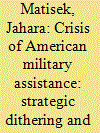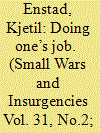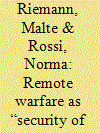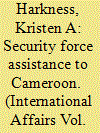|
|
|
Sort Order |
|
|
|
Items / Page
|
|
|
|
|
|
|
| Srl | Item |
| 1 |
ID:
161350


|
|
|
|
|
| Summary/Abstract |
The United States has provided substantial amounts of military assistance and aid since the end of World War Two. During the Cold War, it proved vital in protecting numerous regimes from communist takeovers. Successful outcomes occurred when American leaders made large initial aid commitments, and the states had the capacity and political willpower to use it effectively. However, Vietnam was an example of how U.S. support lagged, as leaders in Saigon preferred political survival instead of creating regime legitimacy. Following 9/11, American security aid focused on making weak countries develop stronger security forces. Unfortunately, this created Fabergé egg militaries: expensive and easily broken by insurgents. This article suggests long-term strategic commitments need to be made alongside more resources for the American State Department and similar organizations to focus on the politics of state-building. Finally, this article suggests strategies, such as “whole-of-government” approaches, to improve long-term security and political institution building.
|
|
|
|
|
|
|
|
|
|
|
|
|
|
|
|
| 2 |
ID:
173839


|
|
|
|
|
| Summary/Abstract |
This article investigates how political ambitions are translated into military practice in the small Norwegian contribution to the International Coalition against ISIL in Iraq from 2017 to 2019. The most important Norwegian political aims do not correspond clearly to a military objective, and thus military practice must take on a symbolic function. Understanding the processes of translation that this requires and the social complexity of operating with such aims with partners and Coalition forces is not straight-forward. The analysis of my interviews with commanders and seconds-in-command concludes by suggesting that such missions may require small-state militaries like the Norwegian to reconceive what constitutes core military practices, and that practice theory or the wider disciplines of sociology and anthropology may inform such a reconception.
|
|
|
|
|
|
|
|
|
|
|
|
|
|
|
|
| 3 |
ID:
164293


|
|
|
|
|
| Summary/Abstract |
Military capacity building (MCB) is as problematic as it is ubiquitous, with the British experience in Sierra Leone providing a rare example of ostensible success. This article critiques the dominant conceptualisation of MCB as purely a principal–agent (PA) problem, using military change scholarship to examine the impact of wartime British intervention on the Sierra Leonean armed forces. Here, indigenous military change was both externally driven and fundamentally adaptive in nature, allowing MCB to bypass some of the difficulties predicted by PA models. However, this adaptive approach nonetheless failed to reconcile Western military values with prevailing Sierra Leonean culture, complicating post-war stabilisation efforts.
|
|
|
|
|
|
|
|
|
|
|
|
|
|
|
|
| 4 |
ID:
181632


|
|
|
|
|
| Summary/Abstract |
This article analyses remote warfare from an ontological security perspective, arguing that remote warfare needs to be understood as a response to states’ internal self-identity needs. We develop this claim by analysing an emerging aspect of remote warfare: Security Force Assistance (SFA). SFA is aimed at building up the security forces of partners, sharing best practice, assisting in security sector reform, fostering collaboration, and overall contributing to conflict resolution. Focusing on the UK, we show how and why ontological security needs are a driving force behind the UK’s SFA program. We outline the UK’s specific autobiographical narrative, which we call a “global engagement identity,” explore the crises that induced ontological insecurity, and show how the UK’s SFA program can be read as a routinised foreign policy practice aimed at taming uncertainty and reinforcing ontological security. This paper makes three contributions. First, it analyses remote warfare through an ontological security framework, thereby moving the focus from “security-as-survival” to “security-of-being.” Second, it highlights the importance of SFA as a remote warfare tool. Third, it shows the centrality of ontological security in understanding UK defence policy.
|
|
|
|
|
|
|
|
|
|
|
|
|
|
|
|
| 5 |
ID:
189242


|
|
|
|
|
| Summary/Abstract |
Western countries have increasingly turned to security force assistance (SFA) to build partner capacity and counter terrorist threats in weakly governed states. This trend sits uncomfortably alongside widespread pessimism that coup-proofed and patronage ridden armies can be meaningfully reformed and made combat effective. Searching for new solutions, both scholars and practitioners have converged on the idea of creating ‘enclave units’—elite forces isolated from the broader military that can be proficiently trained and then deployed on counterterrorism missions. But can enclave units resolve the fundamental interest misalignments that have undermined SFA more broadly? This article leverages the case of the Bataillons d'Intervention Rapide in Cameroon to build theoretical insights into the promises and perils of enclave units. I find that achieving combat proficiency perversely deepens autocracy by strengthening the repressive capacity of dictators. When harshening policies and further marginalization then lead to uprisings, often among ethnic minority groups, embattled autocrats redeploy western trained enclave units against civilians. Extending these insights to the shadow cases of the Iraqi Golden Division and Somali Danab suggests that an indefinite western commitment to remain in-country and directly command enclave units may be necessary to prevent their political misuse.
|
|
|
|
|
|
|
|
|
|
|
|
|
|
|
|
| 6 |
ID:
168004


|
|
|
|
|
| Summary/Abstract |
Security force assistance (SFA) is increasingly emphasised as a way of supporting local partners on the front lines. In this article, Emily Knowles and Jahara Matisek suggest that traditional approaches to SFA are too technical to deal with political problems in fragile states. They suggest a new vision for SFA in fragmented security sectors: a peacebuilding tool for stabilising political settlements that improves relationships across armed groups and between the security sector and civilian population.
|
|
|
|
|
|
|
|
|
|
|
|
|
|
|
|
|
|
|
|
|